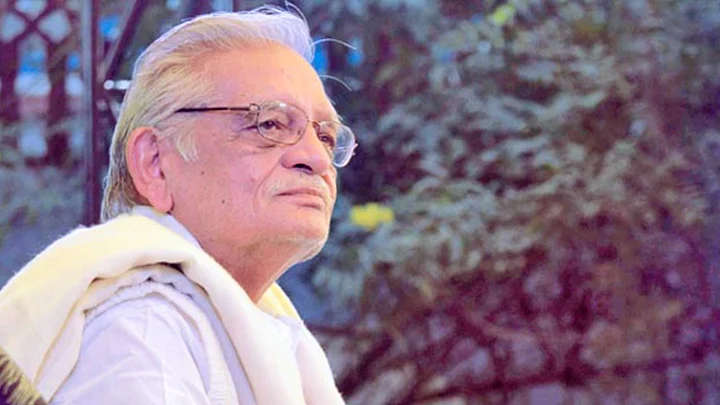Gulzar (born 1934) is one of the most influential intellectual and cultural figures in the Indian subcontinent and a perennial candidate for the next Nobel Prize in Literature from the region after Tagore.
His towering contributions as a poet, short-story writer, filmmaker, scriptwriter, lyricist and children's story-writer are well-known. Less well-known is the fact that he was born in the city of Dina near Jhelum in Punjab thirteen years before the partition of India. I had originally wanted to write a tribute to him when he won India’s most prestigious literary award, the Jnanpith back in February this year.
Today marks his 90th birthday, and the month of August is synonymous with the partition of India, as well as the birthday of Gulzar. Equally well-known is Gulzar’s love for both the Urdu language and Pakistan.
As a birthday tribute, I have chosen to translate five of his short poems from Urdu which showcase Gulzar’s revolutionary side, as well as the fact that in his initial years, he was involved with the Progressive Writers Association. These poems put him in touch with his other progressive counterparts like Allama Iqbal, Faiz Ahmad Faiz and Ahmad Faraz.
The revolutionary poetry of the progressives has its own position in Urdu poetry and long before the start of this movement, Allama Iqbal too had raised a word in favour of the poor.
Jis khet se dahqaan ko mayassar nahin rozi
Us khet ke har khosha-e-gandum ko jala do
(Burn every ear of wheat of that field from which
The farmer is not permitted to partake)
But despite all the revolutionary slogans what do facts on the ground say? See these two poems of Gulzar. In one poem (Zara Allama Ko Koi Khabar Kar De – ‘Someone Just Give Allama the News’), the situation is told with reference to Iqbal,
Zara Allama ko koi khabar kar de
Ke jin kheton se dahqaan ko mayassar na hui roti
Kisi ne khet mein ja kar jalaya bhi nahi
Gandum ke khoshon ko
Kahin koi nahin utha, na koi inqilaab aaya
Janaze uth rahe hain gaon gaon se
Ye sab ke sab janaze hain kisanon ke
Jinhon ne qarz ki mitti chaba kar khudkushi kar li
(Someone just give Allama the news
That the fields from where the peasant could not obtain bread
No one even burnt the ears of wheat in the fields
No one rose in revolt anywhere, neither a revolution came
Funerals rise from village after village
All of them are the funerals of peasants
Who committed suicide by nibbling the earth of debt)
In the other poem (Qafas Udas Hai Yaro – ‘The Cage is Sad, Friends’) the same has been done with reference to Faiz:
Qafas udaas hai yaaro!
Hari mirchi ka aik tukda pada hai
Katori paani ki khaali hai, uundhi ho gayi thi
Parinda ja chuka hai kab ka, qafas mein kuchh nahin hai!!
(The cage is sad friends!
A piece of green chilli lies there
The bowl of water is empty, it had overturned
The bird has long since departed, the cage has nothing!!)
In another poem (Raakh – ‘Ash’), Gulzar said something very revealing with reference to revolution:
Salakhon ke peechhe pade inqilaabi ki ankhon mein bhi
Raakh utarne lagi hai!
Dahakta hua koila der tak jab na phoonka gaya ho
To shole ki ankhon mein bhi
Motiye ki safedi utar aati hai
(Ash too is beginning to descend into the eyes
Of the revolutionary kept behind bars!
When the glowing coal has not been blown since long
Even in the flame’s eyes
The whiteness of cataract descends)
Despite his modern tone and style, there is a tiny revolutionary too present somewhere within Gulzar. This revolutionary wants to speak somewhere in the manner of progressives and in words resembling Iqbal elsewhere but perhaps is not brave enough. This is why he is limited to expressing his anger, but such an expression of rage too does have its own importance.
My point can be judged from the last two poems (Kahin Jana Nahin Hai – ‘Don’t Have Anywhere to Go’ and Main Cigarette To Nahin Peeta – ‘I Do Not Smoke Cigarettes’).
Kahin jaana nahin hai,
Bas yunhi sadkon pe ghumen ge
Kahin pad toden ge signal
Kisi ki raah roken ge
Koi chillaa ke gaali de ga
Koi ‘horn’ bajaye ga
Zara ehsaas to ho ga ke zinda hain
Hamari koi hasti hai!!
(Don’t have anywhere to go
Just loitering on the roads for nothing
Breaking the signal somewhere
Stopping someone in the tracks
Someone will shout an abuse
Another will blow the ‘horn’!
At least we will feel that we are alive
We have an existence!!)
Main cigarette to nahin peeta
Magar har aane vale se bas itna pooch leta hoon ke “Maachis hai?”
Bohat kuchh hai jise main phoonk dena chahta hoon
Magar himmat nahin hoti!
(I do not smoke cigarettes, it’s true
But just ask every passer-by this much
That “Do You Have a Match?”
There is a lot which I want to blow up
But I am just not brave enough!)
Taken together, these five poems speak urgently to the 21st century revolutionary, whether in ‘Naya Pakistan’ here at home or in ‘Shining India’ across the border.
(The writer is an award-winning researcher and translator based in Lahore and President of the Progressive Writers’ Association. He may be reached at razanaeem@hotmail.com. He tweets at @raza_naeem1979.)
(At The Quint, we question everything. Play an active role in shaping our journalism by becoming a member today.)
